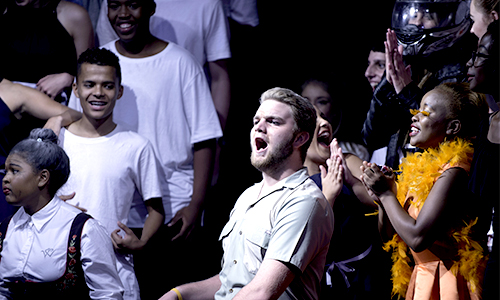
2016 has been nothing short of events that have left students singing the phrase, “What A Time To Be Alive!” This year’s Stagedoor theme had first-year groups re-enacting some of the most memorable times of 2016 and even far into the future.
On 12 March 2016, the show continued with the newly adopted format which was initiated last year, whereby residences are coupled together. With all teams being entered into the finals round, this can be seen as a victory for all, as the crowds of students and parents had the opportunity to see all pairs perform.
Kovsie Church, on the Bloemfontein Campus of the University of the Free State, was packed wall-to-wall with fans and supporters who were high in anticipation of the never-seen-before performances. This resulted in even more excitement for audiences and a tight competition for the residences.
With the theme already set out, the show began to roll, and audiences were enticed with each performance. Audiences experienced the tongue-in-cheek wit of performers, as many scripts had underlying references which left viewers roaring with laughter.
Only three groups could, however, walk away with the top spots. Karee and Arista were third, with Sonnedou and Villa Bravado coming out second, and the trophy was taken by Armentum and Vergeet-My-Nie.
This year, the Arts and Culture office of the Student Representative Council introduced additional categories to the competition. The winners were:
McDonalds Jingle – Legatum and NJ van der Merwe
Best Actor – Bernie Neser
Best Actress – Maynie Knoetze
Best Incorporated Theme – Legatum and NJ van der Merwe